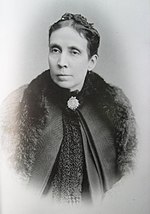Teresa González de Fanning, Date of Birth, Place of Birth, Date of Death
TweetTeresa González de Fanning
Peruvian writer and journalistAbout Teresa González de Fanning
- Teresa González de Fanning (Nepeña District, Ancash Region, Peru, 12 August 1836 - Miraflores District, Lima, 7 April 1918) was a Peruvian writer and journalist notable for her activism in the education of women.
- She founded the Liceo Fanning (1881), a women's college, where she implemented her educational approaches.
- She was the widow of Juan Fanning, a Peruvian war hero who perished during the Battle of Miraflores in the War of the Pacific. Although a somewhat forgotten figure, she is deemed as the precursor to the integral education of women, with practical connotations (including labor formation) as a form of attaining liberation from the patriarchy.
- This is notable because, at the time, Peruvian society still considered that female education should only be aimed at improving their role as housewives.
- A collection of her articles, which had been published in El Comercio, were compiled in a booklet entitled Female Education (1898).
- It was highly critical about women's education, which till then, was exclusively geared to prepare for marriage and motherhood.
- Gonzalez rejected this type of curriculum, promoting in its place the study of music, writing and mathematics as broader preparation with a practical connotation.
- She favored job training which would provide a source of income, allowing women to emancipate themselves from dependence on a husband.
- At lower levels, she suggested a more practical life skills education to learn a trade.
- On another level, she described a more enlightened education, within scientific and philosophical disciplines.
- Her views were recognized as a precursor to modern educational programs for women.
Read more at Wikipedia
See Also
- Famous People's Birthdays on 12 August, Peru
- Famous People's Birthdays in August, Peru
- Famous writer's Birthdays on 12 August, Peru
- Famous writer's Birthdays in August, Peru
- Famous journalist's Birthdays on 12 August, Peru
- Famous journalist's Birthdays in August, Peru
- Famous activist's Birthdays on 12 August, Peru
- Famous activist's Birthdays in August, Peru


 Date of Birth:
Date of Birth:  Place of Birth: Nepeña District, Áncash, Peru
Place of Birth: Nepeña District, Áncash, Peru